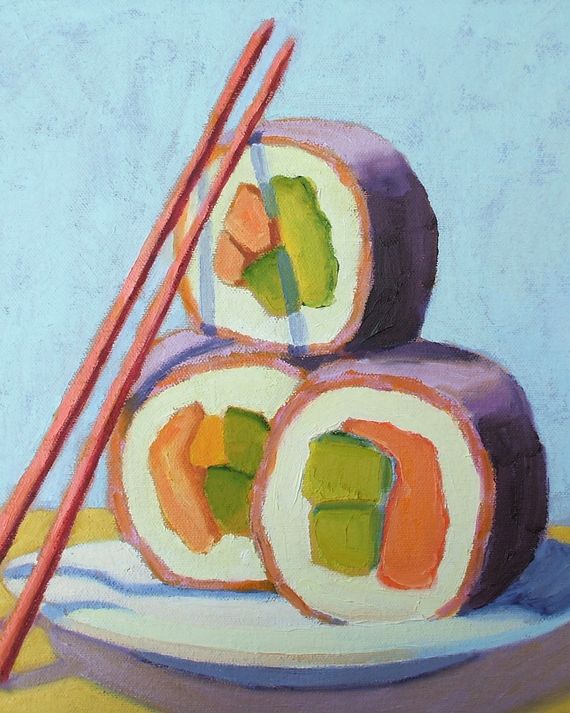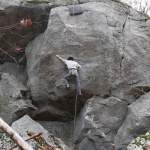
I spent the summer in Budapest learning Hungarian and eating raw fish. At first, I tried to eat the local food — goulash, schnitzel, langosh — and became severely bloated. Every time I ordered something simple it turned out to have lashings of paprika. Even fennel salad. Hungarians don’t appreciate menu substitutions, so I gave up and bought some smoked salmon and rice cakes from the grocery store. This quickly got depressing. Then I Googled sushi and found a restaurant on the Danube River.
It was on a quiet strip, down some stairs that led to a basement with small high windows where you could see people’s feet walking past. I ordered the tuna chirashi and a side of salmon sushi and my sensitive stomach was appeased. So I came back. Three nights in a row and then, surviving the embarrassment of walking in a fourth night, I just let myself go. I went there every night for a month.
Each time I ordered the same thing. When I entered, the staff recognized me and said something in Japanese that was warm and incantatory. No doubt they thought I was mad. Still, I was a loyal and well-behaved customer. The Danube is dirty, but eating raw fish by a body of water was reassuring. Sitting at basement level, watching the feet go by, I felt concealed. There was a child somewhere behind the kitchen door, presumably in the living space occupied by the owners, who was always crying. Normally I hate being in restaurants with noisy children, but somehow this didn’t bother me. I think I accepted the crying child as a toll for fresh sushi in a landlocked country.
Sometimes couples ate in the restaurant. They always ordered too much food and sat on their phones. Something about the bunkerlike space didn’t lend itself to conversation or to acknowledging that one was even conscious of being alive. Or maybe this was how couples ate together now. I hadn’t been in a couple for many years, so I didn’t know. One thing I appreciated about sushi was that there were no bones to choke on. Eating alone at a taverna in Greece the previous summer, I had consumed a bowl of fish soup with so many bones I’d felt like I was trying to detonate a bomb. The experience was both stressful and humiliating, especially with the Greek waitstaff all looking on. I suppose I wouldn’t have died alone there, or even died. But now I felt grateful to the Japanese, as if they had considered such things when inventing their cuisine.
I wasn’t afraid of loneliness; I was in Hungary after all, learning the language of the most linguistically lonely people on Earth. Instead of “ben/ban” (the preposition for “in”), you use “en” for Hungary, meaning “on,” as in “on an island.” I liked to wander the streets alone, to sit in the thermal bath house reading my book on melancholy, blissfully ignored. But dining alone had a starker quality. I first noticed this when I got some wasabi on my chopstick and it made my eyes water. I’d always considered wasabi a great social leveler and have used it several times to force vulnerability onto a male dining companion. But now I felt mortified, and to deflect the shame I laughed, which only made it worse. Two nights earlier I had seen the Barbie movie at a theater packed with Hungarians, none of whom had laughed once. I’d enjoyed this at the time, but laughing now I felt foolish and needy. The involuntary crying made me think of other involuntary responses, like asphyxiation and heart attacks. I was panicking. I only ever felt this way in turbulence on planes — like the flames of hell were licking at my feet and there was no hand to squeeze, no one to make out with. No person with whom to share the horror but myself, and what was the point of that? I was about to be dead. Kierkegaard describes it in more elegant terms as the despair of a self that can’t relate to itself as a self. A despair that emerges in the resistance one feels toward one’s aloneness. A resistance fueled by the desire to lose that self-awareness. To lose the self altogether.
I’d come to Budapest to learn the language and get a Hungarian passport. My mother was born in Hungary, and Hungarians are morose and unfriendly in a way that I appreciate. In Australia, where I was born, I’d always felt alienated. The people were friendly, but this only made it harder. There was something tough and inflexible about their good temperament. They weren’t shellacked like Californians (another place I’d lived); Australians are more like unfinished wood. I’d spent the last two years in Sydney, where everyone I knew had a 3-year-old child, and not only did I not want a 3-year-old child, I didn’t want a partner. I’d spent enough evenings sitting across from a boyfriend as a spiritual abyss opened up between us and life itself seemed to sink into a black, bottomless pit. It wasn’t a problem of restaurants, I’d eventually realized. It was a problem of boyfriends. Maybe it was the ones I’d chosen — unyielding even with wasabi in their eyes — or maybe it was me. Susceptible to bottomless pits; sensitive to the dead air between people; experiencing all disconnection as a paralyzing shame. But I did blame restaurants a bit. That the life of a couple was tethered to the activity of dining, that well-presented food on a plate in a congenial atmosphere was culturally connected to romantic success. Sitting across from my partner and choosing between three kinds of pasta and the fish seemed arbitrary and embarrassing. Or maybe I just wanted to have sex with other people.
And now, because of my bloated stomach, I couldn’t even do that. I’d been on one date with a member of parliament in the impotent opposition party. He’d ordered a cheese plate which I hadn’t touched, and we’d talked about the country’s history and politics. Hungary had always managed to be on the wrong side, he explained. They’d been punished by the Treaty of Trianon and then by the Soviets and now by the hyperliberal West. Hungary had been humiliated time and again, which partly explained the success of their populist leader. The other part was autocracy. Despite his impeccable politics, I didn’t like my date — he was cold and his eyes were the kind of crystal blue that made me think of huskies and psychopaths. Sitting with him, I craved sushi.
Walking home that night along the Danube, I felt an almost ecstatic relief to be alone again. Free to observe the tourists and the drunks and the couples sitting on benches by the water. Free to make individual choices about my life. Small ones like eating sushi instead of cold cherry soup and big ones like not having a family. In Hungary that choice was punished with higher taxes and the withholding of financial loans. But to me, freedom was the ability to remove oneself from the hell of other people. And if anyone ought to agree with my definition, it was the Hungarians.
A few nights later I went to the sushi restaurant and FaceTimed with a friend. The conversation was pleasant, if a little perfunctory. But I realized once it was over that I’d eaten my whole meal without noticing. The experience was disorienting: like when, as a kid, I’d eaten so fast while distracted by television that, looking down at my empty plate, I’d gotten a fright. Who had eaten my food? God? But it didn’t seem like something God would do — more like the Devil. Not that I believed in either. But it felt like a theft — less of my food than of my conscious attention. Sitting in the restaurant after my FaceTime, I felt slightly bereft. My body had ingested the sushi, but I hadn’t been there to experience it. Maybe that’s where the real shame lived. Not in being alone but in trying to pretend otherwise. In ignoring the fact that the company was actually perfectly good.
More From This Series
- What to Do When You’re Feeling Lonely
- You’re Never Alone With an Audiobook
- The Lonely Teens of TikTok




